Just a few days ago I was in London. I was over in the United Kingdom because that's where Warner Bros. was promoting their big Christmas Day release, Sherlock Holmes. As I've said many times, I think the studio is sitting on a winning lottery ticket, as everyone I know that's seen the movie has loved it - myself included.
What's great about the film is it reminds me of the first Indiana Jones movie, as it starts with a big action sequence and immediately you're in the world of Sherlock Holmes. No seeing Holmes as a boy. No needless explanations of why he solves crimes. Instead, director Guy Ritchie has crafted a big Hollywood movie that audiences around the world are going to have fun watching. I think Sir Arthur Conan Doyle would be very happy with the results.
Anyway, at the big press junket this past weekend, I got to talk to Guy Ritchie in his hotel room. We talked about crafting the awesome action sequences (you can see a clip here), are there a lot of deleted scenes on the DVD, the great way they set up the Holmes universe for sequels, is Brad Pitt really in the movie, what is he doing next, 3D and digital filmmaking, and a whole lot more. It's a great conversation that I think you're all going to enjoy. Take a look after the jump:
Since many of you might not have the time to read our entire conversation...Ritchie says there are no deleted scenes on the DVD/Blu-ray, he wouldn't reveal if Brad Pitt is in the movie, he doesn't know what he's going to do next, and he is definitely open to 3D. Much more in the conversation below.
Note: I walked in wearing a Woody Allen t-shirt which had us talking before the tape recorder was on. As I hit record, that's where our interview started...
Collider: Are you a fan of Woody Allen.
Guy Ritchie: You know I don't know enough about Woody Allen to be a fan of him.
Okay. You haven't seen "Manhattan" or "Annie Hall"?
Ritchie: I was too young when I saw both of those movies to be able to comment on the eloquently.
Okay, I'll jump into your film. Absolutely loved it. Great 3rd act, great script, great chemistry. When you are stepping on the set for your first day of filming, are you ever nervous? Especially with this one because of the name and the cast?
Ritchie: I don't think so, no. I used to be. I mean the most nervous I've ever been was on a 250 pound music video which is the first thing I ever did. And I stepped on there with a directing partner, so I could blame him when everything went tits up. But since then my nerves have incrementally decreased so I'm not plagued by the same sense of nerves as I used to be.
There are two really big movies coming out within a week of each other. There's your movie. There's a certain sci-fi movie which will go un-named.
Ritchie: Yeah, I don't know which one you're talking about.
Yeah, I don't know what film it is. There's a huge awareness for your film, do you ever look at what's coming out around you and you're thinking, well, I'm a little concerned. Or are you like I've made the best film I can, what shall be shall be?
Ritchie: I think a bit of both there. I mean, I can only think that there are people that know more about these things than I do, but the other one is clearly has come with some biceps-in many respects much, much bigger biceps than ours. So, you know, it's...who knows? Who knows? But you can't pretend that that's not intimidating in some respect.
I think that you are going to land on your feet quite well on this one. I think that a lot of people...there's something about sci-fi movies that alienates a certain segment of the population and I think people are really going to like Sherlock.
Ritchie: I hope you're right.
I'm pretty confident on this one.
Ritchie: Are you?
Yeah. But I definitely want to talk about the fight sequence in the Punch Bowl. You obviously have a lot of experience with filming fight and action scenes, but the fight sequence and the way that you designed it with him thinking about things, the audience sort of getting the perspective of how he is Sherlock Holmes. Can you talk about how much pre-production or how much pre-vis or how you prepared to do these fight sequences?
Ritchie: Funny enough very little. Very little actually. I suppose the Punch Bowl scene, that was an idea I came up with in about 10 seconds and that's all the preparation that really went into it. It then sort of picked up momentum afterwards as people then sort of made a fuss about it, but it really wasn't a greatly prepared scenario. And the dialogue that's written over the top, I wrote in about a minute or two. It was after I shot it and then as we put it together in the edit, I literally wrote out, didn't I, as I wanted it to be and so the writing of it, you know, head clock to the left and partial deafness in right ear and first point of attack. Break cracked ribs, you know, all that sort of stuff. You probably couldn't dedicate more than 5 minutes to the whole thing. I sort of knew what I wanted going in. Those sort of things are kind of simple. Funny enough they look like they might be complex, but they're not.
I give you huge props. That sequence was incredible and I think that the audience is going to love it and really congratulations on the way it was put together.
Ritchie: Thank you. You're very polite chap. Thanks.
This is interesting because I figured that that stuff must have been very scripted, but obviously I was completely wrong. So how was it with...Robert is known for let's say the word...improv or changing dialogue or adding to his character. How was that when you obviously have a destination of where you're going and a story that you have to tell and how was it with improv on the set and with adjusting to each day and changing dialogue?
Ritchie: Well, I'm pretty in the same camp as Rob in that respect. I think he and I both knew if an idea could be trumped, if he could trump it, I could trump it or anyone else could trump it. If we could trump what was on the page, then great. So inevitably we'd and invariably we'd try to trump what was already there, so I don't care where the idea comes from. And I'm certainly up for ideas as long as we've got enough time to indulge ourselves. So, you know, Rob has ideas and he's a pretty smart chap, which is one of the reasons we went for him as Sherlock Holmes in the first place. But if you had a good idea, then it went in.
Every filmmaker I speak to I always ask what will be on the DVD/Blu-ray. Was there a lot of stuff that you cut out that might be in say an extended cut, or was it all on the screen?
Ritchie: It's all on the screen. It's funny actually, we went through this a couple weeks ago-three weeks ago-and we were looking for deleted scenes. There aren't any. There's not one. Everything's in there which is rather disappointing actually, if you want to see deleted scenes, but no we were kind of efficient in that respect. We used everything.
One of the things I also thought was great was the way you set up for a sequel. You planted some seeds that ended up paying off by the end of the movie. How did you work with Lionel and the screenwriters to come up with a way to plant this for a follow up.
Ritchie: Well, not quite sure how to answer that one. Because it came to me...the script came to me in a condition that was...I suppose it was when one gets involved in Sherlock Holmes one can't help but feel that there is another story to be told because there are just so many stories to be told. So it came already inherent with seeds and I suppose we either augmented that premise or we tried to at least allow some of those seeds to blossom. But I think it's just inherent within the piece that alludes to more narrative.
There's a lot of talk online, something that everyone is trying to figure out, is whether or not a certain big-name star really did film something for this movie. There's a lot of talk that maybe there's a sequence that's going to be put in after the film comes out so people don't see it in advance. Can you sort of allude...
Ritchie: Shed any light on that?
Yeah.
Ritchie: No. (laughter)
Is there a possibility of something being put into the film after critics have seen it? For the general audience? Or is the version that the press has been seeing the final version?
Ritchie: It is, yeah.
Before I run out of time, I definitely want to know you've been rumored for a few other projects. And there's a lot of talk with Warner Brothers that they want to jump right into a sequel on this one. As a filmmaker, are you already thinking about do I want to make another....say assuming that "Sherlock" is very successful. Are you already thinking I want to jump right back in? Or is it something where you want to sort of stretch out and do something else?
Ritchie: I don't know is the answer. Honestly I haven't given it that much thought. I've collected a few eggs over the last few months and I being a being a bit of a hen and sitting on those eggs and I'm sort of waiting to see which one will organically hatches first.
One of the big things in the industry right now is 3D filmmaking. As a filmmaker, are you even thinking about for something that you want to do?
Ritchie: Sure. I've been talking about 3D since before 3D became like a thing. I mean, I like the whole...I like just new stuff in movies, so anything that kind of changes the paragon-those are the movies I'm interested in.
Do you think something like "Sherlock Holmes", there's a lot of filmmakers that talk about how 3D is perfect for certain genres, not perfect for other genres. Is it something that you would consider if you did a sequel? Is it something you'd consider, you know, moving in that direction for all your projects or are you of the belief that it is great for certain genres?
Ritchie: Don't know is the answer to that. I think never say never and this instance is probably the right road to take, because you just don't know. You just don't know. A narrative could lend itself to 3D and as I say I'm just not opposed to any sort of radical changes. I'm just not opposed to it. I remember when film was gradually being eclipsed, I couldn't wait in some of the commercials I was doing 10 years ago to get involved in digital, you know? Because that's when digital first started to look like film. And I remember some people were very emotional about holding onto film and to a degree so am I, but I'd like to champion anything, technology. And one of the interesting and exciting things about my job is watching technological ground being pioneered.
Chris Nolan raised the bar with "Dark Knight" with doing certain sequences in IMAX. Is that something that you would consider doing in a future project?
Ritchie: Well, sure. I mean I suppose it's just an extension of what I'm saying. I would consider anything I thought to be...that would enhance the creative process. So I'll entertain anything.
Okay. One last thing. Was this shot digitally or on film?
Ritchie: Film.
Did you ever think about doing it on any of the digital cameras?
Ritchie: Sure. I would have done but Philippe Rousselot likes to work on film and I'm not opposed to working on film, but the last film RocknRolla I shot digitally.
I have to wrap with you. Thank you so much for your time today.
Ritchie: My pleasure, sir.


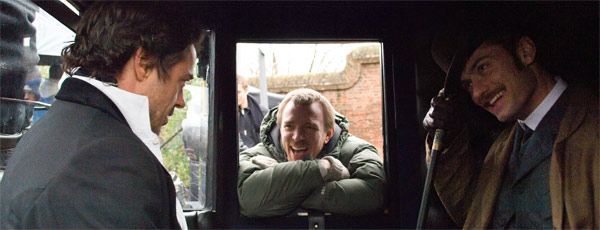
.jpg)
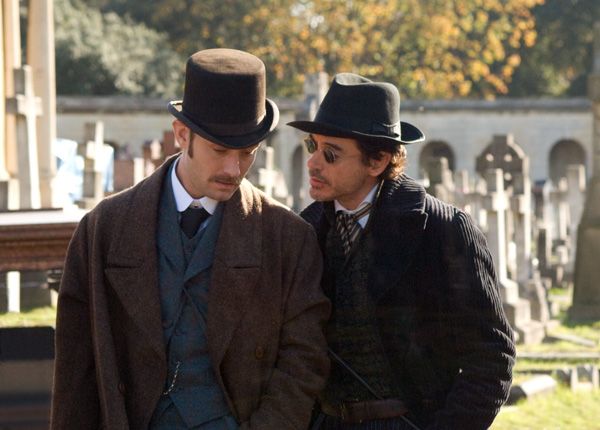
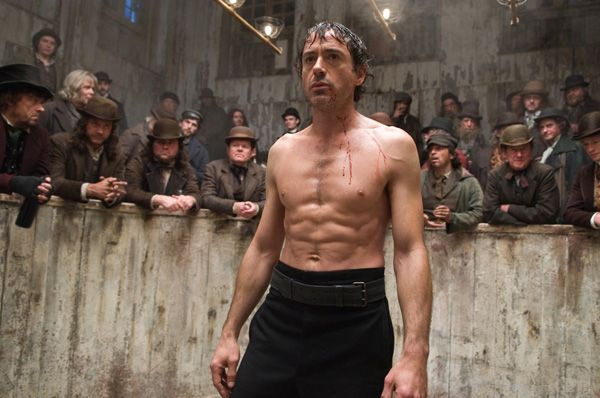
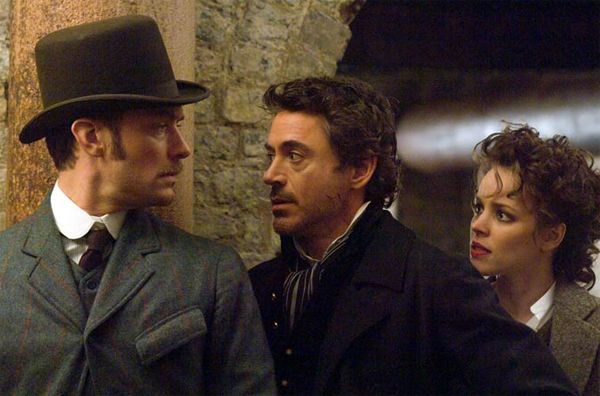
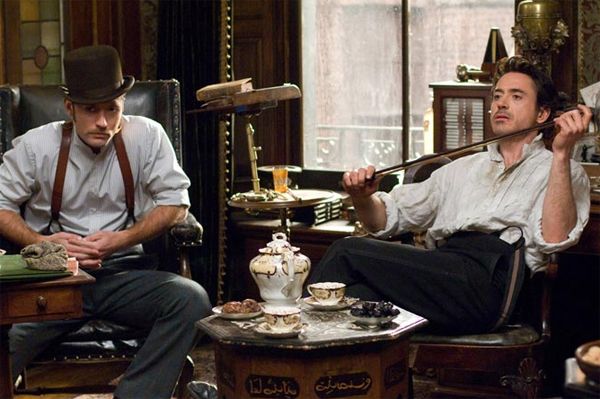
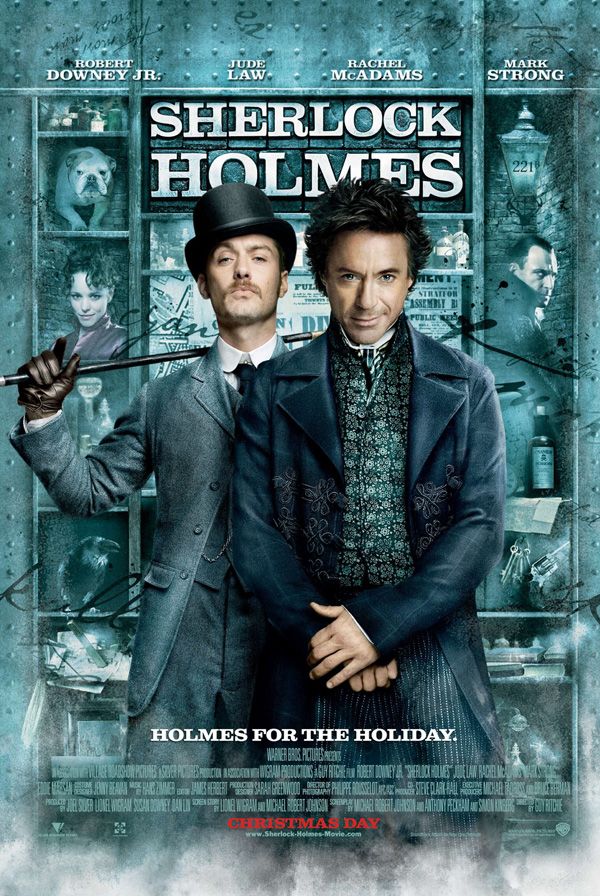
.jpg)